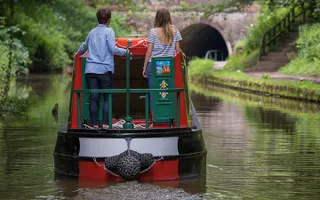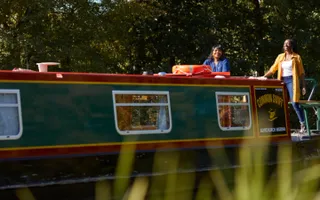We list all mooring providers free of charge on our website. The searchable database displays a detailed description of the mooring and whether there are current vacancies for long term mooring customers. We will also publish news and special events information supplied by mooring operators.
We undertake general promotion of boating on the inland waterways, primarily by exhibiting at the London Boat Show, Crick Boat Show and the National Waterways Festival. We hand out comprehensive 'starter packs' to people interested in buying a boat. This includes information about moorings and links to our website.
Contact the Marketing and Communication Manager in our local office when planning the marketing of your site. They will suggest local media contacts who may be interested in covering the opening of your marina and will ensure that it is included or listed in relevant local Canal & River Trust publications.
Other useful sources:
Other essential information sources used by inland boaters to locate moorings are:
Site maintenance
An off-line mooring scheme is likely to require periodic dredging, potentially every 10 years depending upon the design of the marina and the sediment levels in the adjoining waterway. Mooring schemes on river navigations are likely to experience greater siltation due to the flows of water. The need to dredge will have cost implications particularly related to disposal of the arisings.
Dredging can cause environmental harm through release of contaminants within the sediment, reducing oxygen levels and by the physical impact of silt smothering invertebrates and affecting fish. Environmental mitigation measures should be employed during dredging. You should discuss dredging with our local operational team in advance, so that we can consider the implications for the adjacent waterway. We may also be able to advise on best practice and coordinate with our own dredging plans.
Boundary features, frontages and planting schemes should be designed to limit potential for graffiti and litter accumulation. Floating litter will need to be removed and the use of booms/interceptors may assist its collection.
Use of herbicides in or near water is restricted, even on paving away from the water's edge. The only herbicides which may be used are those specifically permitted for use in or near water and must be used by suitably qualified individuals, for example those registered with the British Agrochemical Standards Inspection Scheme www.basis-reg.com.
Submerged vegetation can be a problem to those who manage mooring sites, but it forms a vital component in the aquatic ecosystem. Treatment of a mooring area can impact on the adjacent waterway and therefore management of aquatic vegetation should only be carried out after consultation with our local operational team.
The structures and facilities on site will have to be maintained which includes cleansing of pontoons, steps and slipways of algae and weed, painting etc. The maintenance of structures over water generates a range of pollutants, including metal particulates, paint, polluted water, detergents and cement. The controls on polluting water are strict and the introduction of any of the pollutants or soils must be avoided. Suitable risk assessments, method statements and pollution prevention measures must be applied. Refer to Planning Policy Guidance 23 (PPG 23) for full details at www.communities.gov.uk.
Facilities for the correct storage of wastes produced by customers will have to be provided and the waste disposed of via appropriate routes. Segregating waste and recycling may reduce waste costs. The local authority will advise of their local requirements. Other issues to consider include litter, dog waste, security etc.
"The Green Blue" is a joint venture by the British Marine Federation and the Royal Yachting Association. Its aim is to promote the sustainable use of coastal and inland waters by watersports participants and the sustainable operation and development of the recreational marine industry The project aims to educate and inform its target audience about their environmental impacts, emphasising how they can avoid or minimise these impacts and promoting good practice through practical projects, training, research and visual materials.
The British Marine Federation have also published 'Environmental Code of Practice' which is a comprehensive guide and useful reference.
Encams (Environmental Campaigns) is a useful organisation that can provide advice and may potentially offer grants for certain aspects of maintenance. They are also the England and N. Ireland contact for the international Blue Flag scheme which is an 'eco-label' award for marinas and beaches that meet environmental criteria. Information can be found at www.seasideawards.org.uk.
Operation
When you are operating, our local office will be your main point of contact.
Once the access from your site to our waterway is open, the terms of our Network Access Agreement with you come into effect. There will be a range of clauses in your agreement which relate to the operation of your site. Refer to the page Our Application Process - Legal Agreements of this website for more information on the Network Access Agreement.
You should ensure that your customers in the marina have a Canal & River Trust licence for their boat and allow our patrol staff access to your site to check boat licences and review records that you keep.
We aim to develop a good working relationship with you at our local office and encourage you to have regular liaison with us to ensure that we understand and support your business where we can.
You should also refer to the page Design and Safety area of this website for information on safety issues relating to site operation.
A biodiversity management plan for the site should be drawn up and implemented to ensure long-term survival of the biodiversity features, both existing and new, of the site.
Useful references and links
- British Agrochemical Standards Inspection Scheme www.basis-reg.com
- British Marine Federation "Environmental Code of Practice" www.britishmarine.co.uk
- Free Government supported advice and consultation to businesses to encourage the use of environmentally friendly technologies. Envirowise has now become part of WRAP (Waste & Resources Action Programme) www.wrap.org.uk
- Planning Policy Guidance PPG 23 (Planning and Pollution Control) www.communities.gov.uk
- Environment Agency "Use of herbicides to control weeds in or near water" www.environment-agency.gov.uk






